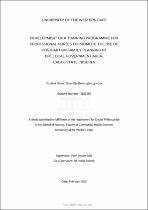| dc.contributor.advisor | Julie, Hester | |
| dc.contributor.author | Igbinoghodua, Omo-Ojo Betty | |
| dc.date.accessioned | 2022-07-05T12:14:59Z | |
| dc.date.available | 2022-07-05T12:14:59Z | |
| dc.date.issued | 2022 | |
| dc.identifier.uri | http://hdl.handle.net/11394/9151 | |
| dc.description | Philosophiae Doctor - PhD | en_US |
| dc.description.abstract | Postpartum family planning (PPFP) is the initiation of family planning methods among
postpartum women, within 12 months after delivery. During this period, the women are a
vulnerable group of people with high unmet need for family planning. They are exposed to the
risks of unwanted pregnancy, which potentially, could increase maternal mortality, due to the
consequences of too frequent pregnancies. Studies have revealed a consistent low use of family
planning during the postpartum period. Additionally, it has been documented that the low use
of postpartum family planning, most likely, was attributed to inadequate services that had been
rendered at healthcare centres, as well as poor motivation by those providing family planning
services. A training programme for nurses, to improve health services, was identified as the
most appropriate for quality healthcare services, to influence the behavioural skill and good
decision making of the PP women, regarding the use of PPFP. | en_US |
| dc.language.iso | en | en_US |
| dc.publisher | University of the Western Cape | en_US |
| dc.subject | Family Planning | en_US |
| dc.subject | Postpartum family planning | en_US |
| dc.subject | Professional nurses | en_US |
| dc.subject | Nursing | en_US |
| dc.subject | Nigeria | en_US |
| dc.title | Development of a training programme for professional nurses to promote the use of postpartum family planning in Epe local government area, Lagos state, Nigeria | en_US |
| dc.title.alternative | Development of a training programme for professional nurses to promote the use of postpartum family planning in Epe | en_US |
| dc.rights.holder | University of the Western Cape | en_US |

